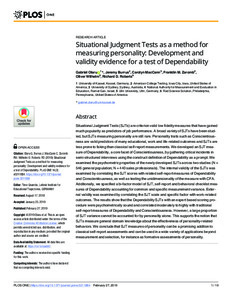Situational Judgment Tests as a method for measuring personality: Development and validity evidence for a test of Dependability
| dc.date.accessioned | 2019-05-21T06:01:33Z | |
| dc.date.available | 2019-05-21T06:01:33Z | |
| dc.date.issued | 2019-02-27 | |
| dc.identifier | doi:10.17170/kobra-20190520490 | |
| dc.identifier.uri | http://hdl.handle.net/123456789/11234 | |
| dc.description.sponsorship | Gefördert durch den Publikationsfonds der Universität Kassel | |
| dc.language.iso | eng | |
| dc.rights | Urheberrechtlich geschützt | |
| dc.rights.uri | https://rightsstatements.org/page/InC/1.0/ | |
| dc.subject.ddc | 150 | |
| dc.title | Situational Judgment Tests as a method for measuring personality: Development and validity evidence for a test of Dependability | eng |
| dc.type | Aufsatz | |
| dcterms.abstract | Situational Judgment Tests (SJTs) are criterion valid low fidelity measures that have gained much popularity as predictors of job performance. A broad variety of SJTs have been studied, but SJTs measuring personality are still rare. Personality traits such as Conscientiousness are valid predictors of many educational, work and life-related outcomes and SJTs are less prone to faking than classical self-report measurements. We developed an SJT measure of Dependability, a core facet of Conscientiousness, by gathering critical incidents in semi-structured interviews using the construct definition of Dependability as a prompt. We examined the psychometric properties of the newly developed SJTs across two studies (N = 546 general population; N = 440 sales professionals). The internal validity of the SJTs was examined by correlating the SJT scores with related self-report measures of Dependability and Conscientiousness, as well as testing the unidimensionality of the measure with CFA. Additionally, we specified a bi-factor model of SJT, self-report and behavioral checklist measures of Dependability accounting for common and specific measurement variance. External validity was examined by correlating the SJT scale and specific factor with work-related outcomes. The results show that the Dependability SJTs with an expert based scoring procedure were psychometrically sound and correlated moderately to highly with traditional self-report measures of Dependability and Conscientiousness. However, a large proportion of SJT variance cannot be accounted for by personality alone. This supports the notion that SJTs measure general domain knowledge about the effectiveness of personality-related behaviors. We conclude that SJT measures of personality can be a promising addition to classical self-report assessments and can be used in a wide variety of applications beyond measurement and selection, for instance as formative assessments of personality. | eng |
| dcterms.accessRights | open access | |
| dcterms.creator | Olaru, Gabriel | |
| dcterms.creator | Burrus, Jeremy | |
| dcterms.creator | MacCann, Carolyn | |
| dcterms.creator | Zaromb, Franklin M. | |
| dcterms.creator | Wilhelm, Oliver | |
| dcterms.creator | Roberts, Richard D. | |
| dc.relation.doi | doi:10.1371/journal.pone.0211884 | |
| dc.type.version | publishedVersion | |
| dcterms.source.identifier | ISSN: 1932-6203 | |
| dcterms.source.issue | 2 | |
| dcterms.source.journal | PLoS ONE | |
| dcterms.source.pageinfo | e0211884 | |
| dcterms.source.volume | 14 |
Dateien zu dieser Ressource
Das Dokument erscheint in:
-
Artikel [1243]

